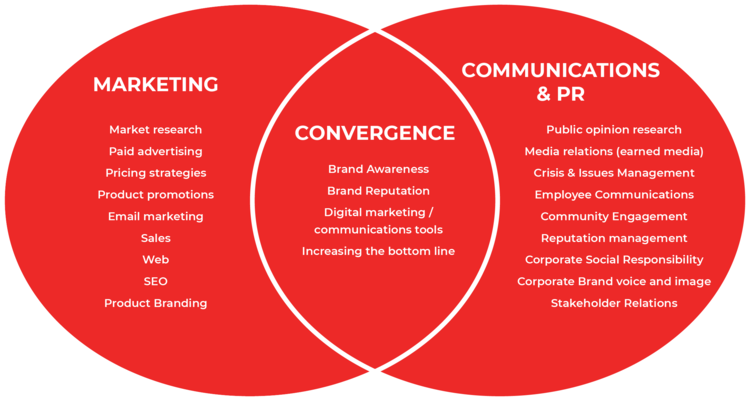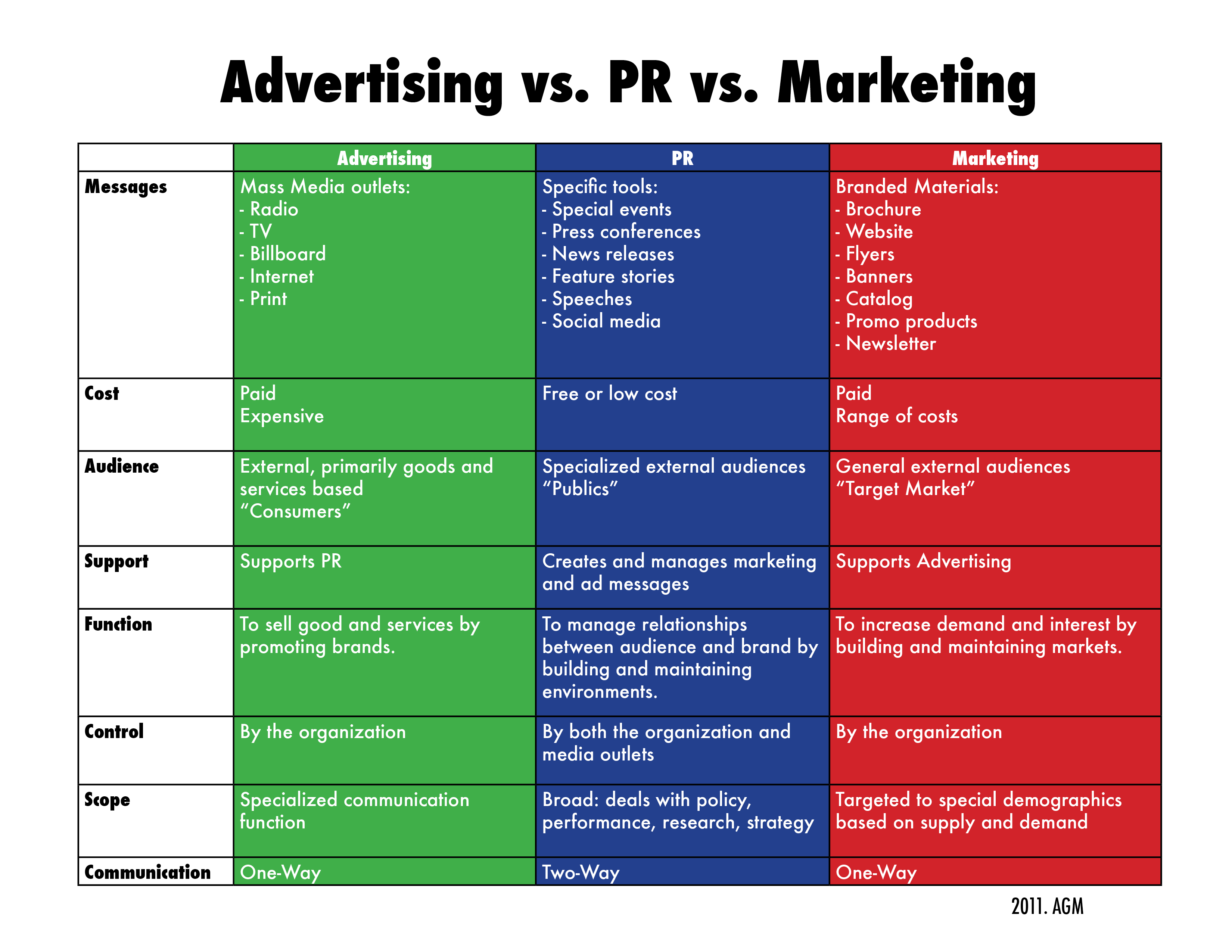Communications Vs Public Relations: Get To Know Which Is Right For You?
Are you curious about the difference between communications and public relations? You’ve come to the right place! In this article, we’ll explore these two fields and uncover their unique characteristics. So, let’s dive in and discover the exciting world of communications and public relations!
When it comes to communications, it’s all about conveying information effectively and persuasively. Whether it’s through writing, speaking, or visual design, the goal is to create a clear and compelling message that captivates the audience. Think of communications as the art of crafting and delivering information in a way that resonates with people.
On the other hand, public relations focuses on managing the reputation and image of individuals, organizations, or brands. It’s like being a master storyteller who strategically shapes public perception through various channels such as media relations, social media, and community engagement. Public relations professionals work behind the scenes to build and maintain a positive public image.
So, now that you have a glimpse into the world of communications and public relations, get ready to explore their fascinating aspects further. Whether you’re interested in becoming a communications expert or a public relations guru, let’s embark on this journey together, unraveling the secrets of these captivating fields. Let’s jump right in!
In the world of communication and public relations, there are distinct differences between the two. Communications focuses on the exchange of information, utilizing various channels for effective messaging. Public relations, on the other hand, emphasizes building relationships, managing reputations, and creating a positive image for organizations. While both play crucial roles, communications tends to be more internally focused, while public relations is more external-facing. Understanding the nuances of each can help businesses effectively navigate the ever-evolving landscape of communication.

Key Takeaways: Communications vs Public Relations
- Communications focuses on delivering messages and information to an audience.
- Public Relations manages the reputation and relationships of an organization.
- Communications includes various channels like social media and advertising.
- Public Relations involves strategic planning and creating positive public perception.
- Both Communications and Public Relations play crucial roles in promoting and maintaining a company’s image.
Comparing Communications vs Public Relations: Understanding the Differences
Communications and public relations are two closely related fields that play integral roles in shaping public perception and promoting organizations or individuals. While they share some similarities, there are distinct differences between the two. In this article, we will delve into the world of communications and public relations, exploring their unique features and comparing them side by side.
Overview of Communications
Communications is a broad field that encompasses the transmission and exchange of information between individuals, groups, and organizations. It involves various channels such as written, verbal, and visual communication. The goal of communications is to effectively convey messages, ideas, and information to specific target audiences.
In the realm of communications, professionals work in diverse areas such as advertising, marketing, digital media, journalism, and more. They utilize communication strategies and tactics to engage with stakeholders, build brand awareness, and drive desired outcomes. Communications professionals are skilled in crafting compelling narratives, managing media relations, and utilizing different communication platforms.
Overall, communications focuses on creating and managing a comprehensive communication plan that aligns with an organization’s goals and objectives. It involves strategic planning, message development, audience analysis, and evaluating the impact of communication efforts.
Overview of Public Relations
Public relations (PR) is a specialized field within communications that focuses on managing and enhancing the reputation of individuals, organizations, or brands. PR professionals work to establish positive relationships between their clients and the public, ensuring effective communication and maintaining a favorable public image.
Public relations encompasses various activities, including media relations, crisis communication, event planning, community engagement, and reputation management. PR professionals are skilled in crafting press releases, organizing press conferences, managing social media presence, and building relationships with journalists and influencers.
The main objective of public relations is to create a positive perception of an individual or organization among the target audience. PR professionals leverage communication strategies to cultivate trust, credibility, and goodwill. They monitor public sentiment, anticipate potential issues, and respond effectively to mitigate reputational damage.
Key Features Compared
Now that we have a general understanding of communications and public relations, let’s dive into a detailed comparison of their key features.
Messaging and Strategy
In communications, messaging and strategy play a crucial role in achieving communication goals. Communication professionals develop key messages that resonate with the target audience and align with the organization’s values and objectives. They create comprehensive communication plans that outline the strategic approach to conveying messages through various channels.
In public relations, messaging and strategy are equally important. However, PR professionals focus specifically on shaping the reputation and perception of the client. They develop tailored messages for different stakeholders and utilize strategic planning to ensure consistent and effective communication.
Target Audience
Both communications and public relations revolve around understanding the target audience and tailoring messages accordingly. In communications, professionals conduct audience analysis to identify the characteristics, preferences, and behaviors of their intended audience. This helps them create content that resonates and engages with the target group.
In public relations, identifying the target audience is crucial for building relationships and shaping perception. PR professionals analyze the demographics, interests, and needs of the target audience to craft messages that align with their values and aspirations.
Media Relations
Media relations is an essential aspect of both communications and public relations. In communications, professionals work closely with media outlets to disseminate information, secure media coverage, and gain visibility. They develop media kits, press releases, and conduct media outreach to ensure that their messages reach the intended audience through different media channels.
Public relations professionals specialize in media relations, as it is a core component of their work. They establish relationships with journalists, pitch stories, and strategically leverage media opportunities to shape public perception. PR professionals are skilled at crafting compelling press releases, managing media inquiries, and engaging with journalists to secure positive coverage.
Online Presence and Digital Communication
In today’s digital age, having a strong online presence is crucial for any organization or individual. Communications professionals are well-versed in utilizing various digital platforms and channels to engage with the target audience. They manage social media accounts, develop engaging content, and utilize digital analytics to measure the impact of their communication efforts.
Public relations professionals also understand the importance of digital communication in managing reputation and engaging with stakeholders. They leverage social media platforms, online forums, and other digital channels to monitor public sentiment, address concerns, and maintain a positive online presence.
Crisis Communication
Crisis communication is a vital aspect of both communications and public relations. In communications, professionals develop crisis communication plans to ensure that organizations are prepared to respond effectively in times of crisis. They are skilled at managing internal and external communication during challenging situations and mitigating reputational damage.
Public relations professionals specialize in crisis communication and reputation management. They are trained to anticipate potential crises, develop crisis response strategies, and navigate difficult situations to protect their client’s reputation. PR professionals serve as spokespeople, manage media inquiries, and craft messages that convey transparency and trust.
User Experience
When it comes to user experience, both communications and public relations aim to create positive interactions and engagement with their target audience. Communications professionals strive to deliver clear and compelling messages that resonate with their audience. They focus on creating a seamless and user-friendly experience through different communication channels, whether it be through advertising campaigns, websites, or social media.
Similarly, public relations professionals aim to create a favorable user experience by managing the media presence and crafting messages that align with the target audience’s interests and values. They focus on building positive relationships and engaging with stakeholders through various communication platforms.
Overall, both fields prioritize user experience to establish meaningful connections, whether it is through delivering informative content, engaging storytelling, or responding to audience feedback.
Pros and Cons
Communications
Pros:
- Offers a wide range of career opportunities in various industries such as advertising, marketing, journalism, and more
- Provides the flexibility to work in different communication roles, including content creation, media relations, social media management, and more
- Enables individuals to develop strong writing, research, and analytical skills
Cons:
- Can be highly competitive, requiring individuals to continuously update their skills and stay updated with industry trends
- May involve working under tight deadlines and handling high-pressure situations
- Requires constant adaptation to new communication technologies and platforms
Public Relations
Pros:
- Allows individuals to shape and manage the reputation of individuals, organizations, or brands
- Offers opportunities for building relationships with influential people in media and other industries
- Provides the chance to work on diverse projects and tackle unique challenges
Cons:
- Requires excellent problem-solving and crisis management skills
- Can be demanding and involve long working hours
- Involves balancing the interests of multiple stakeholders and managing conflicting expectations
Price Comparison
When it comes to comparing the prices in the communications and public relations industry, it varies significantly depending on factors such as the scope of services, geographical location, and the reputation of the professionals or agencies involved. Both communications and public relations services can range from low-cost or freelance options to high-end agencies with premium rates.
It is important for organizations or individuals seeking communications or PR services to consider their specific needs, budget, and the expertise required for their particular goals. It is recommended to research and compare different service providers, request proposals, and evaluate the value they can offer based on their track record, expertise, and pricing.
Comparison Table
| Feature | Communications | Public Relations |
|---|---|---|
| Messaging and Strategy | Developing strategic communication plans and crafting compelling messages | Shaping reputation and perception through tailored messaging and strategic planning |
| Target Audience | Conducting audience analysis and tailoring communication to specific groups | Identifying demographics, interests, and needs of the target audience for effective communication |
| Media Relations | Working with media outlets to disseminate information and gain visibility | Establishing relationships with journalists, pitching stories, and managing media inquiries |
| Online Presence and Digital Communication | Utilizing digital platforms to engage with the target audience and measure impact | Managing online reputation, engaging with stakeholders, and monitoring public sentiment |
| Crisis Communication | Preparing and implementing crisis communication plans to respond to challenging situations | Navigating crises, protecting reputation, and addressing public concerns |
Which is Better – Communications vs Public Relations?
Both communications and public relations play vital roles in effectively conveying messages and shaping public perception. The choice between the two depends on the specific goals, objectives, and needs of an individual or organization.
For those looking for a broader career scope and versatility, communications may be the preferred choice. Communications professionals have the opportunity to work in various industries and roles, gaining expertise in areas such as advertising, marketing, journalism, and more. They possess strong writing, research, and analytical skills.
On the other hand, public relations is an ideal choice for those interested in managing and enhancing the reputation of individuals, organizations, or brands. PR professionals excel in building relationships with media outlets, crafting strategic messages, and navigating challenging situations. They have a keen understanding of crisis communication and reputation management.
3 Reasons to Choose Communications
- Offers a wide range of career opportunities in diverse industries
- Provides flexibility to work in various communication roles
- Develops strong writing, research, and analytical skills
3 Reasons to Choose Public Relations
- Allows for shaping and managing reputation
- Opportunities for building relationships with influential people in media and other industries
- Offers unique challenges and diverse projects
Ultimately, the decision between communications and public relations depends on individual interests, career goals, and the specific needs of a project or organization. Both fields offer exciting opportunities for those passionate about effective communication and shaping public perception.
Frequently Asked Questions
Welcome to our FAQ section on the topic of communications vs public relations. Here, you’ll find answers to common questions regarding these two fields and how they differ from each other. Read on to gain a better understanding of the distinctions between communications and public relations.
Question 1: What is the main difference between communications and public relations?
Communications and public relations are closely related but have distinct focuses. Communications encompasses various methods of sharing information within an organization or with external stakeholders. It involves creating and transmitting messages effectively, whether through written, verbal, or visual means. Public relations, on the other hand, specifically involves managing a company or organization’s relationships with the public. PR professionals focus on developing and maintaining positive perceptions and building strong connections with the target audience.
In essence, communications is a broader field that includes public relations as one of its components. While communications covers internal and external information sharing, public relations specifically deals with crafting and maintaining a positive public image.
Question 2: Can you provide examples of careers in communications and public relations?
Career opportunities abound in both communications and public relations. Within communications, you could work as a communications specialist, public speaker, social media manager, or journalist. These roles involve creating and disseminating information to a specific audience in a clear and effective manner.
In the realm of public relations, potential careers include PR manager, media relations specialist, event planner, and crisis communication specialist. These professionals focus on managing relationships with the public, ensuring positive press coverage, organizing events, and maintaining the organization’s reputation.
Question 3: How do the skill sets differ between communications and public relations?
While there is some overlap in required skills, communications and public relations each have their unique emphasis. In communications, skills such as effective writing, verbal communication, visual storytelling, and media production are crucial. This field revolves around creating compelling messages and delivering them through various channels.
On the other hand, public relations requires skills such as relationship building, media relations, crisis management, and strategic planning. PR professionals excel at managing external perceptions of an organization and finding ways to positively influence the public’s opinion.
Question 4: How do communications and public relations work together?
Communication and public relations go hand in hand, as effective communication is essential for successful PR. Communications professionals provide the necessary tools and strategies to transmit messages effectively, while public relations experts use these resources to build relationships, manage reputations, and shape public perception.
Communications supports public relations by ensuring clear and consistent messaging, creating compelling content, and utilizing various communication channels. Public relations, in turn, uses these communication tools to effectively engage with the target audience and deliver key messages.
Question 5: How can one decide between a career in communications or public relations?
Choosing between a career in communications or public relations hinges on personal interests and career goals. If you enjoy writing, public speaking, and content creation across a wide range of topics, communications may be a better fit. On the other hand, if you are passionate about relationship building, managing an organization’s reputation, and working closely with the media, public relations might be the right choice.
It’s advisable to explore both fields through internships, informational interviews, or job shadowing to gain a firsthand understanding of the day-to-day responsibilities and see which resonates more with your interests and skills. Ultimately, your decision should align with your passions and long-term career objectives.

Summary
So, let’s wrap up what we learned about communications and public relations! In simple words, communications and public relations are two different but related things.
In the article, we found out that communications is all about sending and receiving information. It helps us share our thoughts, ideas, and feelings. Public relations, on the other hand, is about building and maintaining a good reputation for a person, organization, or company.
We also learned that both communications and public relations use different tools. Communications uses things like social media, email, and phone calls. Public relations uses things like press releases, events, and media interviews.
Remember, communication is important for all aspects of life while public relations is more focused on managing how people see you or a business. By understanding the difference between the two, we can use them effectively in our lives and careers. So go out there, communicate well, and build a positive image for yourself or your brand!




